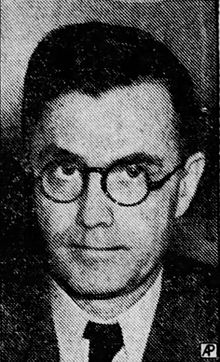Eugene Talmadge
| Eugene Talmadge | |
|---|---|

Newspaper photo of Talmadge during 1938 U.S. Senate campaign
|
|
| 67th Governor of Georgia | |
|
In office January 10, 1933 – January 12, 1937 |
|
| Preceded by | Richard Russell, Jr. |
| Succeeded by | Eurith D. Rivers |
|
In office January 14, 1941 – January 12, 1943 |
|
| Preceded by | Eurith D. Rivers |
| Succeeded by | Ellis Arnall |
| Personal details | |
| Born |
September 23, 1884 Forsyth, Georgia, United States |
| Died | December 21, 1946 (aged 62) |
| Political party | Democratic |
| Alma mater | University of Georgia |
| Profession | Politician |
Eugene Talmadge (September 23, 1884 – December 21, 1946) was a Democratic politician who served two terms as the 67th Governor of Georgia from 1933 to 1937, and a third term from 1941 to 1943. Elected to a fourth term in November 1946, he died before his (January 1947) inauguration. To date only Joe Brown, in the mid-19th century, and Eugene Talmadge have been elected four times as Governor of Georgia.
Eugene Talmadge was born in 1884 in Forsyth, Georgia, to Thomas and Carrie (Roberts) Talmadge. He attended the University of Georgia and graduated from the university’s law school. While at UGA, he was a member of the Phi Kappa Literary Society and Sigma Nu fraternity.
Talmadge set up a law practice in Telfair County, Georgia. He twice ran for the Georgia state legislature and lost both times. He was elected as state agriculture commissioner in 1926. Talmadge was re-elected commissioner in 1928 and 1930.
As commissioner, Talmadge used the newspaper of his department to give advice to farmers and talk about his political views, extolling the virtues of a laissez-faire economic policy (there would not be a State Agriculture Commissioner under laissez-faire – so it is doubtful that Eugene Talmadge used this term) and individual action to improve the well-being of farmers. During his time as agriculture commissioner, Talmadge also developed a reputation for being a corrupt, freewheeling individual who disregarded standard ethics and played by his own set of rules. He maintained widespread support among Georgia’s rural community. He was also an “admitted flogger and racial demagogue who presided over a Klan-ridden regime”.
...
Wikipedia
